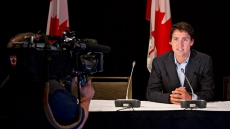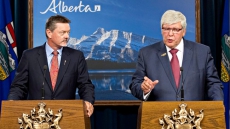An Arctic planning body has taken the federal government to court, claiming Ottawa is blocking efforts to create a land-use plan that would guide resource development in Nunavut.
The Federal Court lawsuit by the Nunavut Planning Commission comes as Prime Minister Stephen Harper makes his annual trip to the North to highlight the importance his government attaches to the region.
Commission head Percy Kabloona, who says the lawsuit is the first of several to come, has accused the Conservatives of trying to interfere in the plan's development and to block its final steps.
"Clearly, the completion of a single land-use plan for the Nunavut Settlement Area that reflects the priorities and values of residents ... is not a priority of the current government," said a news release Tuesday from the commission.
In an interview, Kabloona said Ottawa has shown little support for Inuit attempts to plan for development on their land.
"They probably would like to do it by themselves," he said.
A spokesman for Aboriginal Affairs Minister Bernard Valcourt said the government has provided $3 million a year to the commission for the last 18 years.
The Nunavut Planning Commission was created out of the 1993 Nunavut Land Claim Agreement. The commission was charged with designing legally binding plans that would lay out which lands would be protected, which would be open for development and how they would be managed to encourage local control and economic progress.
The commission alleges it had either completed or begun six regional plans by 2005 when the federal government announced it would no longer consider them. The commission then began work on a plan for the entire territory and a draft was completed by 2011.
It includes recommendations for protected wildlife areas as well as for road corridors, mineral and energy exploration areas and mixed-used regions.
Workshops and consultations have been held in each of Nunavut's 25 communities, as well as 10 communities in Saskatchewan, Manitoba and Quebec. Submissions were received from various levels of government and national aboriginal groups. A federally sponsored third-party review of the plan judged it as "reasonable," according to a July 2 letter from the commission to Valcourt.
The commission says Valcourt's department has refused to provide $1.7 million needed to conduct a final public hearing, which is legally required before the plan can become law. Those hearings, which had been planned for the fall, have been cancelled.
Meanwhile, plans for development are going ahead.
"We know there's no time to waste," Kabloona said.
The commission's letter to Valcourt outlined what it believes will be the result of blocking the plan.
"The regulatory system will be slow and cumbersome. The (commission) will fumble project proposals. Industry will lose millions as legislated timelines are missed.
"Growing concerns of Inuit, First Nations and Metis around development in areas they rely on for food will slow and eventually stall the environmental assessment process."
The commission says denying funding for the final hearings is only the latest of the government's attempts to financially stifle its work. Funding for the commission has never been revisited since its inception, although the land claim says it was supposed to have been reviewed in 2003.
As a result, the commission says it can only afford to fill half its approved positions.
Harper is expected to head north for his ninth Arctic trip on Wednesday. His itinerary has not been released.
Kabloona said Harper is likely to hear about the issue, especially during an expected stop in Cambridge Bay.
"I'm pretty sure (people) will be asking him questions."
The planning commission isn't the first to accuse Ottawa of reneging on its promises under the Nunavut land claim.
The government also faces a billion-dollar lawsuit from the group that oversees the claim's implementation. Nunavut Tunngavik Inc. says that while Canada promised a representative number of jobs in the territorial government would go to Inuit, it failed to provide the education necessary to make that a reality.
In 2006, a mediator agreed, saying Ottawa lost interest in the territory once it was up and running.
A judgment on part of that lawsuit has gone against the government.





